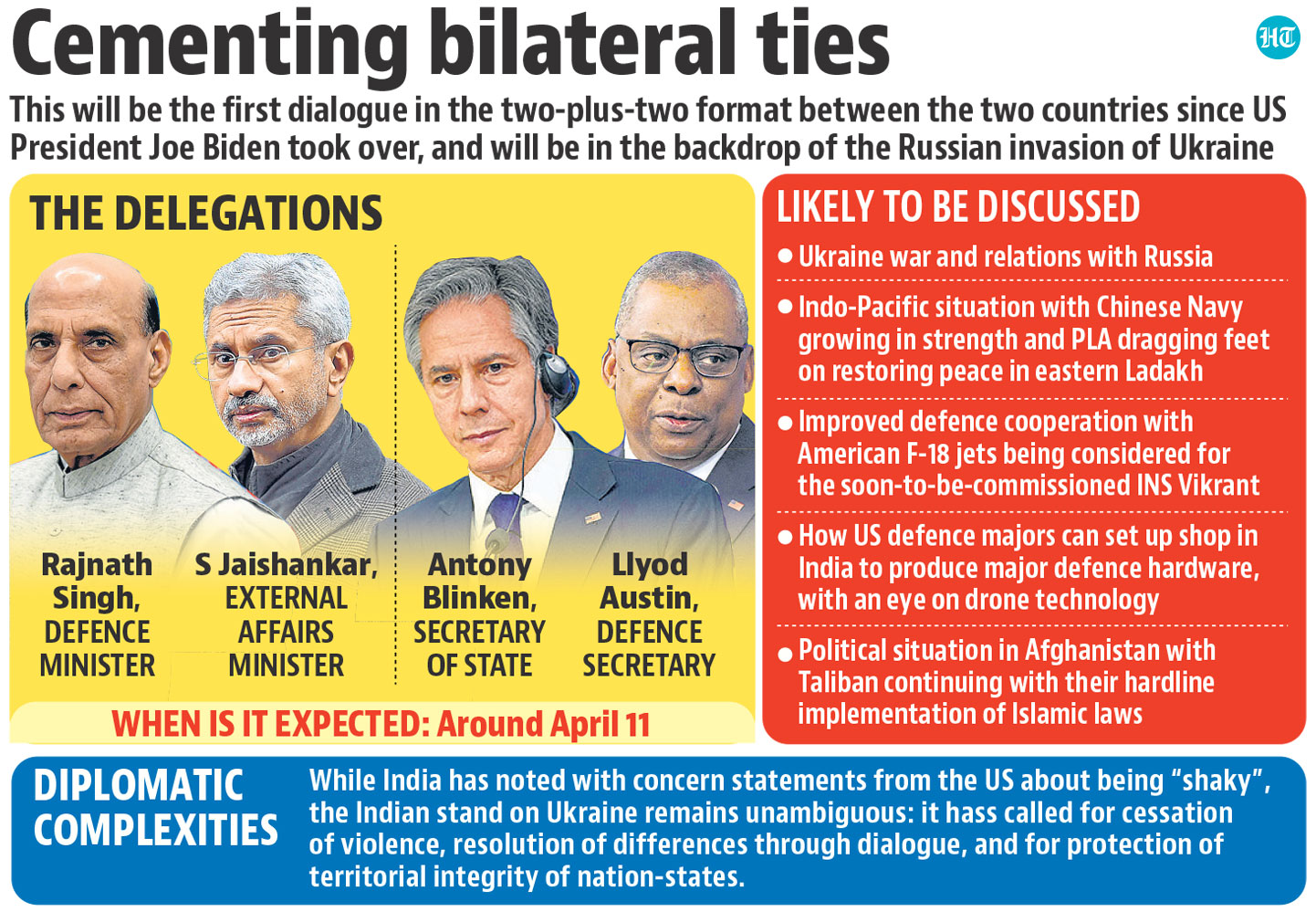India-US To Hold Two Plus Two Dialogue Around April 11

While India has noted public statements from the Biden administration over the Ukraine war with concern, New Delhi’s position on the ongoing war is vastly different from China's as it is all for cessation of violence and protecting the sovereignty and territorial integrity of Kyiv. EAM Jaishankar and US Secretary of State share a close working relationship with all issues on the table.
In the backdrop of the ongoing Russian invasion of Ukraine, defence minister Rajnath Singh and external affairs minister S Jaishankar will meet their US counterparts around April 11 to further cement defence and political ties as well as exchange notes on Ukraine and Indo-Pacific theatres of concern. This will be the first dialogue in two plus two formats between India and US since President Joe Biden occupied the White House.
While India has noted with concern public statements from the US about New Delhi being “shaky” and “wrong side of history”, the stand of the Narendra Modi government is quite unambiguous on Ukraine as it has called for the complete cessation of violence, resolution of differences through dialogue and for the territorial integrity of nation-states. PM Modi has communicated the same stance to Russian President Putin as well as Ukraine President Volodymyr Zelenskyy during telephonic conversations. New Delhi also remembers the silence from EU countries particularly Germany in criticizing China for PLA’s unilateral transgression on East Ladakh LAC in May 2020. The same EU countries are still buying oil and gas from Russia while being sanctimonious towards India over the Ukraine war.

During the two plus two dialogue, US Secretary of State Antony Blinken and Defence Secretary Llyod Austin are expected to share the American assessment of the Ukraine war, which is now dragging along with Russian forces losing steam and Moscow redefining war objectives.
The two sides will also share assessments on the Indo-Pacific with the Chinese Navy growing by the day and PLA dragging its feet on restoring peace and tranquillity on the East Ladakh LAC. The fact is that the PLA is still fully deployed in the occupied Aksai Chin area with heavy weaponry and long-range missiles in-depth areas of Xinjiang and Tibet.
India and US will also increase defence cooperation with the American F-18 deck based fighter being considered for the soon to be commissioned aircraft carrier INS Vikrant. The twin-engine multirole combat jet is expected to undergo ski jump trials at INS Hamla in Goa in April-May with trials of Rafale-M already concluded in January this year. The Indian Navy is expected to purchase at least 36 jets for INS Vikrant as indigenous deck based fighter is years away from fruition.
While India wants to indigenously develop armed drones under PM Modi’s “Atmanirbhar Bharat” initiative, the two sides are expected to discuss how US defence majors can set up shop in India in tie-up with domestic manufacturers and manufacture major defence hardware provided Pentagon does not attack legal or operational strings to the project.
The two sides will also discuss Afghanistan with the Taliban continuing with regressive measures and hardline implementation of Islamic laws by keeping girls out of schools and women out of jobs. The political situation in Afghanistan continues to be grim with traditional Taliban leaders led by Mullah Yaqoob at loggerheads with the Pakistani ISI backed Haqqani Network led by global terrorist Sirajuddin Haqqani. The same political flux holds true for Pakistan with Prime Minister Imran Khan facing a strong challenge in a no-confidence motion moved by the Opposition. With China behind his back, Imran Khan has added the US to the list of enemies led by India while taking no action against terror groups proliferating in the Islamic Republic in the name of jihad in Kashmir and beyond.


